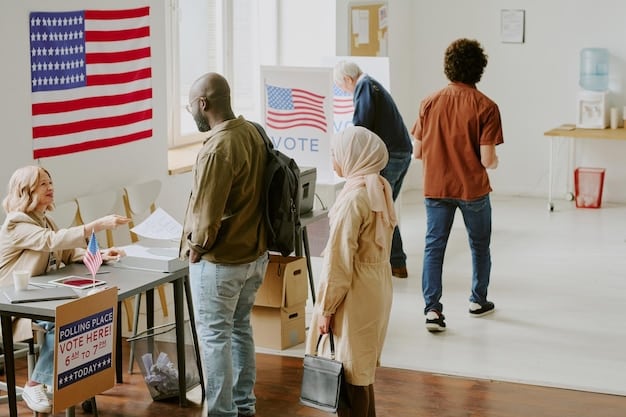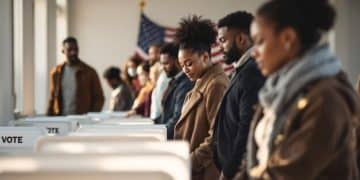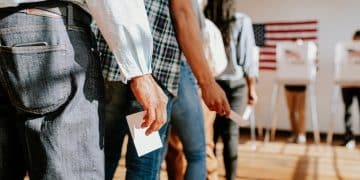State Voting Rights: Changes in the Next Election Cycle

Changes in state-level voting rights for the next election cycle include new voter ID laws, adjustments to absentee ballot rules, and modifications to registration processes, potentially impacting voter access and participation across the United States.
As the next election cycle approaches, significant changes are occurring in state-level voting rights across the United States. Understanding these shifts is crucial for voters, policymakers, and anyone interested in fair and accessible elections. Let’s delve into the key changes coming to state voting laws and their potential impact.
Upcoming Changes to State Voting Laws
State legislatures across the country are actively debating and implementing changes to their voting laws. These changes often reflect partisan priorities and can significantly affect voter access, turnout, and the overall electoral landscape. Let’s explore some common types of changes being considered.
Voter ID Laws
One of the most debated areas of voting law involves voter ID requirements. States are considering or implementing stricter forms of identification that voters must present at the polls. These laws can range from requiring photo IDs to limiting the types of acceptable identification documents.
Changes to Absentee Voting
Absentee voting, also known as mail-in voting, saw a surge in popularity during the COVID-19 pandemic. As a result, many states are now reevaluating their absentee voting procedures. Some states are tightening restrictions on who can request an absentee ballot, while others are expanding access.
- Stricter ID Requirements: Some states now require a copy of an ID to be included with the absentee ballot.
- Shorter Deadlines: The deadlines for requesting and returning absentee ballots are being reduced in some states.
- Limits on Drop Boxes: Restrictions on the availability and location of ballot drop boxes are being imposed.

Ultimately, understanding these changes is crucial for ensuring that all eligible citizens can exercise their right to vote. Staying informed about the laws in your state and actively participating in the electoral process will help safeguard the integrity of our elections.
Registration Process Modifications
The ease with which someone can register to vote is a critical factor in voter participation. Many states are making adjustments to their registration processes, either to streamline the system or to introduce new safeguards.
Automatic Voter Registration (AVR)
AVR automatically registers eligible citizens to vote when they interact with certain state agencies, such as the Department of Motor Vehicles. Several states are considering adopting or expanding AVR to increase voter rolls.
Same-Day Registration
Same-day registration allows individuals to register and vote on the same day, either during early voting or on Election Day. This can significantly boost turnout, especially among young and newly eligible voters.
The modifications to registration processes will continue to be a dynamic area in election law, with potential for both expanding and restricting voter access. Staying informed is essential for those seeking to promote fair and representative elections.
Impact on Voter Access and Turnout
Changes to state-level voting rights can have a profound impact on voter access and turnout, particularly for certain demographic groups. It’s crucial to analyze how these changes affect different populations and the overall fairness of elections.
Disproportionate Impact
Studies have shown that stricter voter ID laws and limitations on absentee voting can disproportionately affect minority voters, low-income individuals, and people with disabilities. These groups may face greater challenges in obtaining required identification or meeting strict absentee ballot deadlines.
Potential for Suppression
When changes to voting laws make it more difficult for eligible citizens to vote, it raises concerns about voter suppression. It is essential to ensure that all changes are implemented in a way that does not discriminate against any particular group or create unnecessary barriers to participation.
The impact of state voting rights changes extends beyond mere logistics and can significantly influence the composition of the electorate and the outcomes of elections. Close monitoring and analysis are crucial to ensuring that all citizens have an equal opportunity to exercise their right to vote.

Legal Challenges to Voting Laws
Many of the recent changes to state voting laws have faced legal challenges, with civil rights groups and advocacy organizations arguing that they violate the Constitution. Understanding these legal battles is crucial for tracking the future of voting rights.
Voting Rights Act
The Voting Rights Act of 1965 is a landmark piece of legislation that prohibits racial discrimination in voting. Legal challenges often argue that new voting laws violate the Voting Rights Act by creating barriers to participation for minority voters.
Constitutional Amendments
Challenges may also be brought under the Fourteenth and Fifteenth Amendments to the Constitution, which guarantee equal protection under the law and prohibit denying the right to vote based on race, color, or previous condition of servitude.
- Injunctive Relief: Courts may issue injunctions to block the implementation of voting laws that are likely to cause irreparable harm to voters.
- Declaratory Judgments: Courts can issue declaratory judgments, stating that a particular voting law is unconstitutional.
- Settlements: Some legal challenges are resolved through settlements, where states agree to modify or repeal contested voting laws.
The outcomes of these legal battles could significantly reshape the electoral landscape, either by upholding stricter voting laws or by striking them down as discriminatory. Paying attention to these cases is vital for anyone concerned about the future of voting rights.
The Role of State Legislatures
State legislatures play a central role in shaping voting rights through their power to enact and amend election laws. Changes in partisan control of state legislatures can lead to significant shifts in voting policy.
Partisan Agendas
Voting laws often become a battleground for partisan agendas, with each party seeking to gain a competitive advantage through changes to voter registration, ID requirements, and access to absentee voting. This can result in policies that are perceived as favoring one party over another.
Bipartisan Efforts
While partisan disagreements often dominate the debate, there are also instances of bipartisan efforts to improve election administration and expand voter access. These efforts are often focused on streamlining voter registration, modernizing voting equipment, and ensuring election security.
Understanding the motivations and actions of state legislators is crucial for assessing the potential impact of voting law changes. Staying informed about legislative debates and engaging with elected officials can help shape voting policy in a way that promotes fair and accessible elections.
Advocacy and Civic Engagement
Individuals and organizations can play a crucial role in shaping voting rights through advocacy and civic engagement. By becoming informed, engaging with policymakers, and working to promote voter participation, citizens can make a difference in the electoral process.
Voter Education
One of the most important things individuals can do is to educate themselves and others about the changes to state-level voting rights. This includes understanding voter ID requirements, registration deadlines, and absentee voting procedures.
Contacting Policymakers
Citizens can also contact their elected officials to express their views on voting rights issues. This can be done through phone calls, emails, or letters. Policymakers are more likely to respond to constituent concerns when they hear from a large number of individuals.
Active citizen participation is essential for ensuring that elections are fair, accessible, and representative of the will of the people. By staying informed, engaging with policymakers, and working to promote voter participation, individuals and organizations can help shape the future of voting rights.
| Key Point | Brief Description |
|---|---|
| 🔑 Voter ID Laws | States are implementing stricter photo ID requirements at polling stations. |
| 🗳️ Absentee Voting | Changes include stricter deadlines and ID requirements for absentee ballots. |
| 📝 Registration Processes | States are modifying automatic and same-day registration procedures. |
| ⚖️ Legal Challenges | Voting laws are facing legal challenges under the Voting Rights Act. |
Frequently Asked Questions (FAQ)
▼
Acceptable forms of identification vary by state, but often include a driver’s license, state-issued ID card, U.S. passport, or military ID. Some states may accept non-photo IDs such as utility bills or bank statements.
▼
Some states are reducing the window to request and return absentee ballots, while others are implementing stricter ID requirements or limiting the availability of drop boxes. Certain states are also expanding access to mail-in voting.
▼
AVR automatically registers eligible citizens to vote when they interact with certain state agencies, such as the Department of Motor Vehicles (DMV). This system is aimed at increasing voter registration rates and streamlining the process.
▼
Yes, many changes to state voting laws are facing legal challenges under the Voting Rights Act and the Constitution. Courts may issue injunctions or declaratory judgments that can block or modify the laws in question.
▼
Individuals can contact their elected officials via phone, email, or letter to express their views on voting rights. Participating in public forums, attending town hall meetings, and supporting advocacy organizations can also make a difference.
Conclusion
Staying informed about the evolving landscape of state-level voting rights is crucial for ensuring fair and accessible elections. As changes continue to be debated and implemented, it is essential to understand their potential impact and advocate for policies that uphold the fundamental right to vote. Be sure to check your state’s specific regulations prior to any election.





